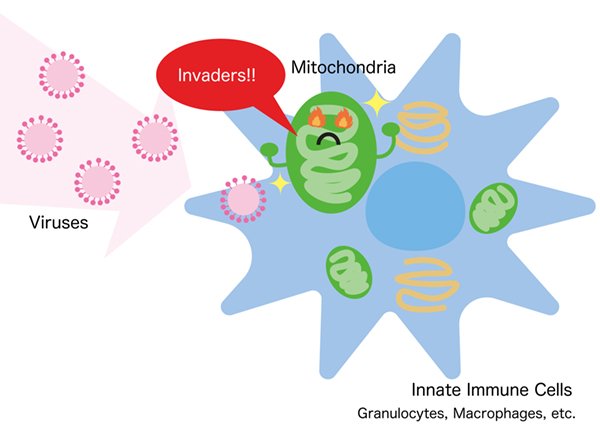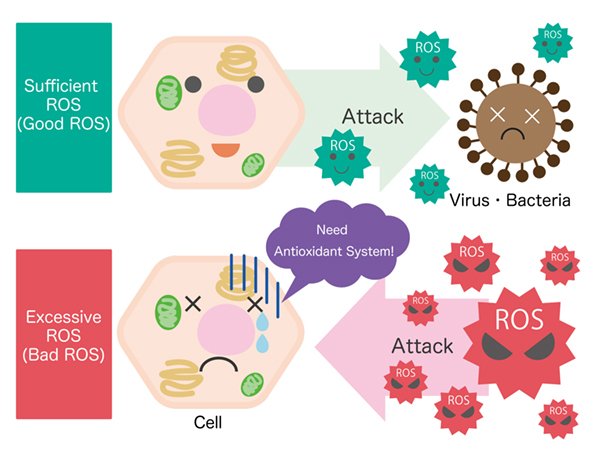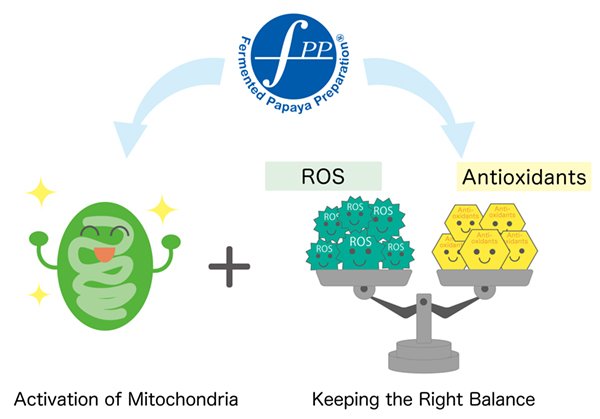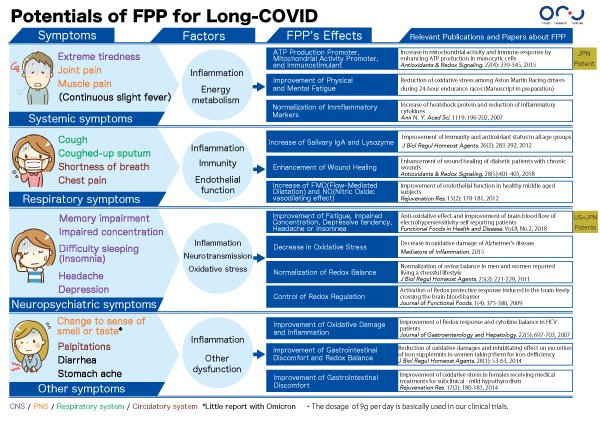Approach to Infectious Diseases with FPP
From the perspective of infectious disease prevention, in Wisdom Note Vol.1 we introduced that FPP promotes ATP production in mitochondria, referred to as the 'power house' of the cell, as the result, immune cells can work properly with sufficient energy and immune functions are improved. In Vol.2, we explained that FPP increases salivary Immunoglobulin A (IgA), an antibody that plays an important role in the immune function of mucous membranes, to prevent foreign invaders from entering the body. We now would like to focus more on possibility of FPP against infectious diseases with deep insight into "immune functions".

The main role of mitochondria in the cell is the production of ATP, the energy currency of cells. However, in recent years, a number of studies have demonstrated that mitochondria are also deeply involved in innate immunity against virus invasion. *1
Particularly, when mitochondria detect RNA virus, immune responses such as production of type I interferon and inflammatory cytokines are enhanced to fight against the virus. It means that mitochondria function like a control tower of innate immunity and therefore activation of mitochondria help induce innate immune response effectively. FPP is patented for improving and activating mitochondrial dysfunction, energy production, which is known to be one of the causes of developing diabetes. We believe that taking FPP is thought to enable proper activation of mitochondria, which instructs immune cells such as macrophages to attack the invaders immediately, leading to a short-term recovery from an infection.


There are two sides to reactive oxygen species (ROS): "Bad" ROS gives deleterious effects to the body and "Good" Ros gives beneficial effects. A state of excessive ROS is known as oxidative stress, in which Bad ROS can cause cellular damage and contribute to acceleration of ageing or various diseases such as Alzheimer disease or diabetes. *3, 4
On the other hand, when invading viruses or bacteria are detected, Good ROS is used by the immune system as a weapon due to its high oxidative power to attack and eliminate the invaders. Our body is equipped with an antioxidant system to eliminate Bad ROS. However, along with aging, oxidative stress increases due to a decline in the efficiency of the antioxidant system. *5
It has been demonstrated that FPP has effects on the antioxidant system to reduce excessive Bad ROS, at the same time has effects on the immune system to attack viruses or bacteria by promoting Good ROS production. In other words, FPP regulates two conflicting actions by affecting both antioxidant and immune systems.

While many aspects of COVID-19 still remain unclear, people suffer from "long COVID", long-term effects of coronavirus, which affects their daily lives after recovering from the original infection. It is reported that there are several risk factors associated with long-COVID syndrome including age, pre-existing diseases or high BMI, as well as increased oxidative stress and decreased anti-oxidant system. *6, 7 Some young people also experience long-COVID, but obviously, ageing is one clear risk factor. Therefore, it is likely that reducing oxidative stress and promoting antioxidant production would contribute to a clinical benefit via anti-inflammatory effects for those patients. It is also important to take enough nutrients in order to activate immune system for quick recovery after infection. The bottom line is "To eat is To live". FPP is a food that has been proven over the years of clinical research to be effective and safe for improving antioxidant function, anti-inflammatory effects, in addition to improving gastrointestinal disorders (e. g. an anorexia). This suggests that FPP has the potential to be a new medical food for the prevention of severe symptoms of COVID-19 as well as long-COVID, for which no effective treatment has been developed yet.

The COVID-19 pandemic is not over yet and the number of infections has been increasing due to new variants of the virus. As a result, some people experience "long-COVID" after recovering from the original infection of COVID-19, suffering from extreme tiredness, headache, shortness of breath, problem with concentration, etc. which affect their daily lives. It remains unclear what exactly causes long-COVID, but such problems could be caused by excessive inflammation due to the viral infection. There is no definitive therapy and we are still not clear how long it would take to cure symptoms for long-COVID. In such circumstances, we have been discussing with ORI's staff as to how FPP can contribute to maintaining people's health and decided to make this report so that we could suggest measures against infectious diseases based on the results of FPP clinical researches conducted at universities and research institutes in Europe and the United States.
FPP supplementation enhances production of salivary IgA, which help prevent upper respiratory tract infection, not only in young but also elderly people. It means that FPP can improve the first line of defense against infectious agents. In addition to such defense, we believe maintaining mitochondrial function and keeping a good balance between ROS and antioxidant is the key to overcome infectious diseases by protecting cells from excessive inflammation.

References
*1. Yasukawa, K., & Koshiba, T. (2021). Mitochondrial reactive zones in antiviral innate immunity. Biochimica et Biophysica Acta (BBA)-General Subjects,1865(3), 129839.
*2. Dickerson, R., et al. (2015). Does oral supplementation of a fermented papaya preparation correct respiratory burst function of innate immune cells in type 2 diabetes mellitus patients? Antioxidants & Redox Signaling, 2(4), 339-45.
*3. Barbagallo, M., Marotta, F., & Dominguez, L. J. (2015). Oxidative stress in patients with Alzheimer's disease: effect of extracts of fermented papaya powder. Mediators of Inflammation.
*4. Okuno, Y., et al. (2018). Oxidative stress inhibits healthy adipose expansion through suppression of SREBF1-mediatedlipogenic pathway. Diabetes, 67(6), 1113-1127.
*5. Marotta, F., et al. (2012). Is there a potential application of a fermented nutraceutical in acute respiratory illnesses? An in-vivo placebo-controlled, cross-over clinical study in different age groups of healthy subjects. Journal of Biological Regulators and Homeostatic Agents, 26(2), 283-292.
*6. Kumar, P., et al. (2022). Severe glutathione deficiency, oxidative stress and oxidant damage in adults hospitalized with COVID-19: Implications for GlyNAC (Glycine and N-Acetylcysteine) supplementation. Antioxidants, 11(1), 50.
*7. Paul, B. D., et al. (2021). Redox imbalance links COVID-19 and myalgic encephalomyelitis/chronic fatigue syndrome. Proceedings of the National Academy of Sciences, 118(34).









